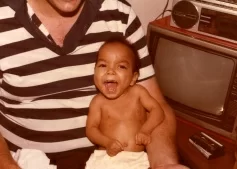 without a thought on my part. But Luke came to my mind yesterday and I looked up some information on him and discovered that his birthday had just passed. I found this old article that I wrote about Luke a few years ago. I thought I'd share it again. I am convinced that there are important and significant lessons we can learn from his life, and that I need to regularly share what I think they are. I hope you enjoy this!
without a thought on my part. But Luke came to my mind yesterday and I looked up some information on him and discovered that his birthday had just passed. I found this old article that I wrote about Luke a few years ago. I thought I'd share it again. I am convinced that there are important and significant lessons we can learn from his life, and that I need to regularly share what I think they are. I hope you enjoy this!The mysteries of God are a part of the Christian life that can often lead to confusion, doubt and even discouragement for believers.
- For some, it's a pride thing. We want to have answers – we want to understand, to be able to grasp the complexities of Biblical truth and God's plan for mankind.
- For some, God's mysteries – the unexplained things of life – are stumbling blocks to faith:
1. Why do bad things happen to good people?
2. Why does He allow pain, suffering and evil to thrive in our world?
Several months ago we were witnesses to the aftermath of the tragedy in Pennsylvania involving the Amish community, where, good, decent, hard working, non violent people were subjected to unspeakable cruelty towards their children. How can this happen?
3. One of our CSC children, who grew up in the worst poverty imaginable in Cebu City, was adopted into a family in the United States several years ago. Well meaning people would tell her how lucky she was and how God obviously had a wonderful plan for her life. She had a hard time with that and would sometimes ask her parents, "But what about all the kids who are still there, who weren't adopted, and who are still suffering and dying? What is God's wonderful plan for their lives? Why me and not them?
For many of us, we celebrate the goodness of God in our lives, we praise him for his healing, for material comforts, for blessing our efforts – even as we observe people who remain sick or disabled, who suffer in poverty – those who efforts and initiatives end in disappointment and ruin.
There are two extremes in terms of people's reactions to the things about God and life that are not understood.
1. There are those who try in vain to grasp the ungraspable – to be able to reduce the mysteries to understandable formulas or explanations. I remember a young seminarian who came to Cebu and who filled the pulpit of our church on a Sunday evening. He preached for an hour on the "peace of God that passes all understanding." Perhaps he felt that if he preached long enough he could crack that nut and open our understanding!
We all know those who have reduced the book of Revelation to precise charts and timetables, giving us easy to understand categories for all of human history and, most especially, the times to come.
2. A second category are those who shake their heads and say, "We'll only know these answers when we get to heaven." They suspend inquiry, not bothering to seek answers to the perplexing questions of life.
Living and working in a Third World country like the Philippines brings some of these mysteries to the front of our lives. Poverty, and all that goes with it, is "in your face." People often ask me "How do you like living in the Philippines?" That's a tough one to answer. Life anywhere has its highs and lows. Some days are great, others are difficult. I often answer this way:
1. When I'm sitting down to a nice breakfast I am aware that, within a few meters of my house are families that have no breakfast.
2. When I'm driving to the office or the Shelter I often pass people walking along the road who, for lack of a few cents can not even afford public transportation and must walk.
3. When I stop to buy medicine for my family or the CSC kids, there are people standing nearby whose children are dying for lack of that very same medicine.
Why am I blessed and they are not?
I recall a conversation with a missionary a few days after Cebu was hit by a strong typhoon. Many of our CSC workers lost their roofs or their entire homes. The houses of the poor were devastated by the high winds and torrential rains. The missionary said that it had been such a miracle how God spared the missionary homes from damage, holding his hands of protection around us during the storm. I remember wondering whether it wasn't more a matter of our having cement houses and strong metal roofs.
Why did our CSC kids have to suffer so much? And how much more, those who live on the street and cannot be admitted to CSC?
These are tough questions. When it comes to trying to understand our own suffering, the Bible gives some answers. For example, Romans 5:3-4 tells us that suffering produces perseverance, perseverance character, and character, hope. And the Bible gives us additional hope that we will someday come to see God's purpose and mysteries:
"But now we see through a glass dimly, but then face to face."
And we hear the testimonies of Christian brothers and sisters who have lived through terrible times and have turned negatives into positives in their lives.
Several months ago I was attending a conference in Bismark, North Dakota. One of the featured speakers was Steve Saint, Steve's father, Nate Saint, was one of the five missionaries killed in 1956 by Aucan warriors in Equador. Steve told about what that tragic day meant to his family, and what it was like when his dad, his hero, didn't come home that day. We saw video of his current family life, and saw a man who was interacting with Steve's children, and who was being referred to as "Uncle." It turns out that this was the very man who had killed Steve's father, who had come to know Jesus and had experienced the forgiveness of God and of the Saint family and now was a part of their family – an amazing story of how good things had come out of tragedy and suffering.
So the clear message is that God has a plan for our lives, we will discover that plan in the right time. He is writing our life's stories, but some of the chapters are difficult ones.
We can understand this. We can, when aided by the Holy Spirit, see how difficulties and suffering are part of a purification process for us, and that we, like Job, will eventually be better people for it.
But what about people who, because of major disabilities, are unable to understand their situation, unable to discern the hand of God or his plan for their lives. Where is the purification and growth and ultimate value for these people? What could God's purpose possibly be?
Back on 1982 a baby was born in a charity ward in a small hospital in Cebu City. 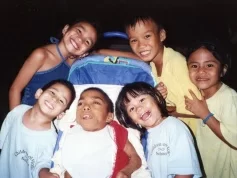 The baby underwent cardiac arrest during birth and was without oxygen for an extended time. Unlike many cases of charity patients, the hospital staff decided to resuscitate the baby, even after he had suffered massive brain damage and cerebral palsy. The baby's mother abandoned him in the hospital, and after a couple months Luke was referred to CSC. When we took him in he appeared to be a bouncing baby boy. We did not know that he would not develop physically beyond about a year and a half, or mentally beyond a few months. Luke would never speak, nor have voluntary movement of his arms or legs.
The baby underwent cardiac arrest during birth and was without oxygen for an extended time. Unlike many cases of charity patients, the hospital staff decided to resuscitate the baby, even after he had suffered massive brain damage and cerebral palsy. The baby's mother abandoned him in the hospital, and after a couple months Luke was referred to CSC. When we took him in he appeared to be a bouncing baby boy. We did not know that he would not develop physically beyond about a year and a half, or mentally beyond a few months. Luke would never speak, nor have voluntary movement of his arms or legs.
Luke became a fixture at CSC. For over 23 years he was an integral part of our lives and a symbol of CSC and what we are all about.
Many times Luke would be hospitalized – often due to upper respiratory infections. He fought for his life many times. There were at least a dozen times when we were sure that he would die. The doctors had told us that he wouldn't make it past five years old. Then they revised it to nine, then 11 – certainly he wouldn't reach his teenage years.
One time, when Luke was critically ill our staff met to pray and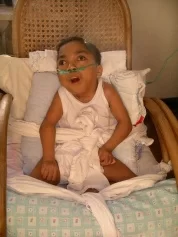 I asked them to reflect on his life. Here is why: I believe that God had a purpose for Luke's life when he created him. I believe that He uses people like Luke to teach us important things. But here is the rub: If we don't spend time reflecting on these lessons, then Luke's life is useless. Its up to us to allow God to make sense of Luke's life.
I asked them to reflect on his life. Here is why: I believe that God had a purpose for Luke's life when he created him. I believe that He uses people like Luke to teach us important things. But here is the rub: If we don't spend time reflecting on these lessons, then Luke's life is useless. Its up to us to allow God to make sense of Luke's life.
And what are the lessons that we found? What has God taught us through his life?
1. First, life is precious. Even though he had nothing to live for, from the world's point of view, Luke clung to live almost ferociously. Some of us who have much more to live for take life casually, we take life for granted. Not Luke. Every day was a struggle. Every breath had to be fought for. Life is a gift from God and we should treat it carefully.
2. God has provided us with opportunities, through Luke's life, to minister to him in significant and life-saving ways. He has provided an avenue for us to live out the biblical mandate to minister unto the "least of these," because, truly, Luke was in that category. Hundreds of people have been given a blessing to participate in the support of CSC that reaches out to children like Luke and many others with other special needs.
3. In so doing, He has given us a chance to show others a Godly value system that doesn't reserve love and attention for those who have something to give back, or who have "potential" or a bright future. For many people who live in a developing country, where resources are limited, this has been a difficult lesson to learn. How could we justify spending so much money for Luke's hospitalization when other, "normal" kids needed care? Luke's life gave us the opportunity to teach about the value of life and about how God looks at all of us.
4. Luke has been a tremendous ambassador for CSC. People around the world remember observing the loving care that he received by our staff and workers. They remember his famous smiles. They may quickly forget the names of the staff or other children, but they remember Luke. "How's Luke doing?" we get asked wherever we go to talk about the ministry of CSC. And our care of Luke helps us explain the true nature and core values of our work in the Philippines.
5. Luke has been a safety valve for those that had an opportunity to know him. My job as Field Director of CSC involves lots of administrative chores, like making budgets, government relations and various kinds of problem solving. There are days when I get stressed out and start to feel the weight of the world on my shoulders. But all I needed to do is to drive a few short miles to where Luke lived, to hold him in my arms, and I get a clear picture of what real struggles are all about. My struggles paled in comparison to what Luke faced every day. Self pity may be easy for some people, but those that knew Luke have no excuse for feeling sorry for themselves. What a great gift that was to all of us.
A little over a week before we left Cebu, Marlys called me on my cell phone and told me that I should get to the hospital quickly, as Luke wasn't doing well. He had been hospitalized for over a week and his breathing was bad. I had gotten messages similar to this one throughout Luke's life, so I went to the office and took care of a few things. But the Lord laid it on my heart to go see Luke and when I entered his room his breathing was extremely labored. He looked different than I had ever seen him, and it became clear that he was dying. I sat down next to him, kissed him and looked into his eyes. For 23 years we had loved this boy. It wasn't easy to say goodbye. I said to him, "Luke. You can go. Go to be with Jesus, Luke. I love you." Within a couple of minutes Luke took his last breath. 23 years of pain, suffering, limitations, hospitalizations, forced breathing, skin rashes and infections were over. We would never see Luke's smile again.
As Luke was dying in that hospital room, I made a promise. I'm not sure if I was making a promise to Luke, to God or to myself. But I decided then and there that I was going to talk about Luke on our coming furlough. I believed then and do now, that the church of Jesus Christ needs to hear about Luke, that the lessons of his life are important ones. Many Americans are complainers - full of self pity. People who have so many material comforts are unsatisfied. American discourse is increasingly a chorus of victim and entitlement claims. Charles Sykes, in his book "A Nation of Victims: The Decay of the American Character" states that, "in a nation where everyone is a victim, no one is a victim." In our preoccupation with our own needs we have a hard time seeing the needs of others – people like Luke.
In his song "God Help the Outcasts," the Hunchback of Notre Dame poses several difficult issues:
I don't know if there's a reason
Why some are blessed, some not
Why the few You seem to favor
They fear us, flee us,
Try not to see us.
The first part we have already examined. The second is our call to arms. "Why the few You seem to favor, they fear us, flee us, try not to see us."
I don't know what factors might make it difficult for us to see the needs of society's outcasts. Perhaps we are too busy. Maybe our personal and church calendars are so full that there just isn't room for Luke, or the man who had fallen to thieves at the side of the road, to break into our day. Maybe we are numbed or fatigued by the needs of others, or simply overwhelmed by the circumstances of our own lives. Maybe we have become cynical. "Why did that guy travel this road at this time carrying that amount of money? He deserves what he got!"
Maybe, just maybe, Luke can help cut through the apathy, the self-centeredness and cynicism of our lives. He was a person with significant needs that he didn't cause. He was totally dependent on others to live. His life had none of the possibilities and opportunities that we take for granted every day. He needed us so very much. Maybe Luke can serve as a symbol of many others that we come into contact with. Maybe Luke can help us rescue our lives.
Fil Am Frienship 2018
Philippine American Friendship Day was celebrated at CSC with hot dogs, games, a parade and lots of fun.
Unsung Heroes
I have been allotted six minutes by the emcee for the history of the school, which comes out to 18 seconds per year. I've already lost a couple years by telling you this! So lets get going.
It would be foolhardy to try and capture the whole history of Children of Hope School. Even the many red letter dates would be too much. And as I prepared for this presentation I realized that even mentioning all the people who have had significant contributions here would be too time consuming. Suffice it to say that hundreds of people have given of their time, talent and treasure to help this school, including many of you here tonight. So I'm going to summarize.
I'll talk about two groups – the heroes and the unsung heroes.
Some of the heroes of Children of Hope School are here and will be honored or mentioned tonight.
Dan Chalmers, with his wife Carla, made the donation that allowed us to build this school. Without their generosity and responsiveness to God's leading, we would not be here tonight.
Lisa Saavedra was one of the visionaries who started this school. Her progressive ideas about education and her willingness to go to bat for CHS with the Dept. of Education, and her work as our school principal for many years was foundational.
Shari Reasoner's hard work, talent and foresight allowed our school to improve and be more responsive to the needs of our kids.
Those are our heroes and we will be sure to honor them tonight.
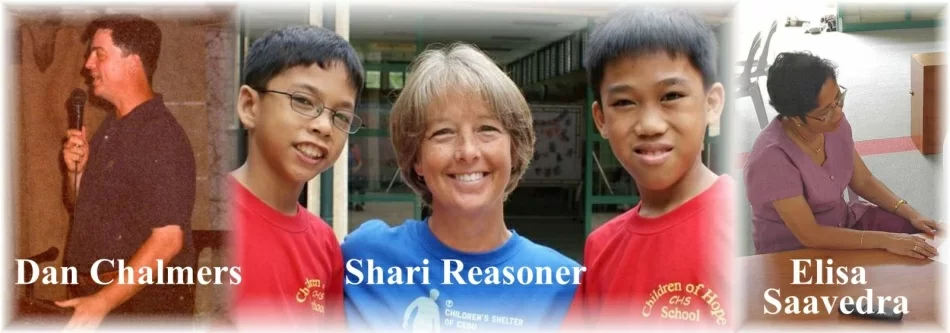
But I want to mention a few unsung heroes, people whose contributions might not be known to many here tonight.
Ron Duterte was the best friend that our staff ever had in Cebu. He was generous with his time, his influence and his heart. Many don't know that Ron was, technically, the first Principal we had at CHS. We needed a name when we submitted our papers for registration, and we penciled him in. His doctorate was respected and we were off and running. Like the pace car in an automobile race, he soon pulled over and let someone else take the reins, but he was our first.
Nancy Healy helped us greatly by writing the first curriculum for our school, using her knowledge and experience in multi-age classrooms, and her big heart for the CSC kids. She helped us pioneer a type of education that was previously not known in the Philippines and was a big help to our first teachers. She and Lisa worked together to get CHS started and provide a standard for our education that is still being realized today.
Brian Kusunoki heard about CSC from a friend from Minnesota where he used to live. When he moved to Hong Kong for his work he told the Union Church about CSC. He came down to visit us on behalf of the church and went back excited about our school idea. His promotion of our ministry in that church resulted in a major contribution for outfitting our school, particularly our main activity room which is named for the church.
Jan Druckenmiller is an early childhood educator who had a vision for our pre-school program. She wrote a curriculum, did teacher training, sent over materials and came often to help out with our younger students.
I want to mention one more unsung hero, and that is Paul Reasoner. Shari's commitment to the school and coming here several times a year had a cost, and Paul generously gave her up, though it meant that they were often apart. Paul's willingness to have her in Cebu so much is a contribution to CHS that we often overlook. Not tonight.
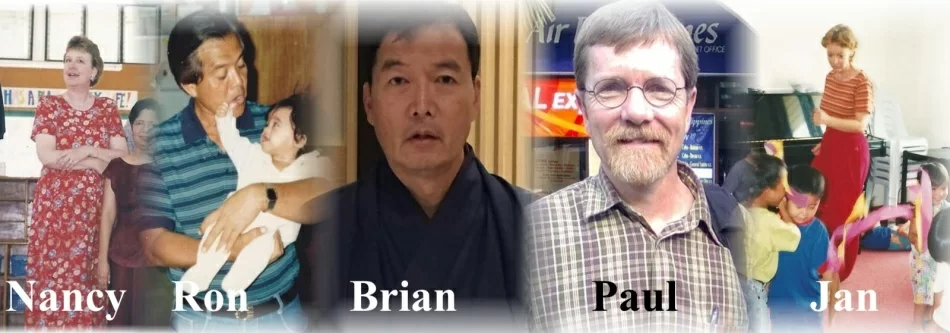
There are many more. Many more. People who came along just when we needed them to teach, contribute or encourage. God has always filled the slots and raised up the heroes that we needed to establish this school and keep it going.
School Anniversary celebration
It was a great weekend of celebration. Children of Hope School is 20 years old! Recently we had several events to commemorate this anniversary. On Saturday morning, June 16 we had a carnival for the CSC children and the kids of our workers in the playground area of the Shelter. It was a time of laughter, fun, eating and playing. The various booths were manned by CHS faculty and some of our high schoolers. That night there was a banquet at the Grand Convention Center. Friends, former teachers and administrators and current staff and faculty were in attendance to see videos, enjoy cultural dances by the children, eat and celebrate 20 years of God's goodness at CHS. The night featured several testimonies from former and current students and faculty using the theme, "Stories of Hope." On Sunday morning a worship service was held at the school. We praised God for who He is and what He has done at CHS. Our kids were in the worship team and gave testimonies. Rev. Lowell Tallo gave an inspiring message and 20 of our children were dedicated in an emotional service after the main worship time.
Children of Hope School has truly been a blessing to many children over the years, as well as those wh0 have had the privilege to teach there. It was fun to hear all the stories of how God has used the school to bless people and prepare our kids for whatever will come next in their lives after CSC.
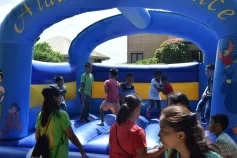
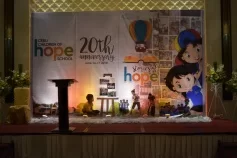
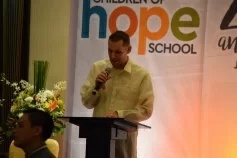
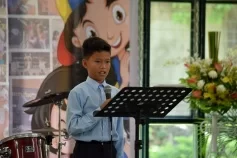
Thomas Needs Prayer Again
The following was written by Marlys yesterday when we found out that our little TomTom would need surgery the very next day. Today. Please pray with us that he will recover from this dangerous surgery. We love him so.
Hello everyone,
Dr. Aldana is the son of a prominent neurosurgeon in Cebu, who was one of our doctors way back in the early 80's. He is here with a team from Florida, doing surgeries at the government hospital called Vicente Sotto Medical Center. He examined Thomas yesterday, along with our own surgeon, Dr. Mark Gigataris, and a Pediatric Intensive Care specialist, also from Florida. They have an organization that raises funds to do surgeries for low income patients, and they happened to have one vacant bed so admitted Thomas yesterday afternoon to VSMC. The director of the neurosurgery department, Dr. Briones, was also at the meeting. Dr. Briones said that VSMC has the best and most complete facilities and equipment to perform the surgery that Thomas needs to address his urgent need, which is to remove the fluid that is building up in his brain. The surgery, called Endoscopic Third Ventriculostomy, will be done in a few hours. While doing the surgery they hope to drain the fluid, but if they notice that it isn't working well they will put in a shunt during this procedure. They would prefer to put the shunt in two to three months later, but they will have to wait to see how things progress today.
Thomas is in the pediatric ward, which is about the size of our lab in the infirmary. There are six patients in there, and there is barely space for a chair in between the beds. There is an air conditioner, so that is a blessing.
Thomas has complained of headaches lately, and the Aunties told us that sometimes he just lies down suddenly, so those are signs that the hydrocephalus is starting to cause some problems.
The next surgery will be done in a few months to reconstruct the back of the skull, as there is an obstruction there, which caused cysts to form on the spinal cord. Six titanium plates will be needed, which cost P40,000 each. Dr. Aldana brought plates with him, so he will donate some of them for Thomas, and the surgeries will all be free. As you can imagine, we were thrilled to hear that. He said that Dr. Gigataris has a huge job ahead of him to help our precious Thomas. Dr. Gigatiris is thankful that Dr. Aldana is here to help with the ETV, as it sounds like he hasn't done this particular surgery very often.
Thomas adores Dr. Gigataris, and whenever he gets a bit nervous he calms down immediately when we reassure him that Dr. Mark will be with him every minute of his surgery.
When Dr. Gigataris first met Thomas four years ago he told us he would need to do complicated reconstruction of his skull for sutures that were fused prematurely. When he heard how he needed surgery in Manila for stents in his nostrils to breathe when he was five months old, he told us with tears in his eyes, "This boy has been fighting for his life, and I want to help him fight even more." He did an amazing job with Thomas in 2014 and has taken good care of him ever since.
Dr. Gigataris' wife is Tom's neurologist. One day when we were in her office she told Tom that she loved him. He said, "I love you" back to her, but was looking at the colorful decals on her walls, not really paying attention to her. She held his face in her hands and told him that if he is going to tell someone that he needs to look the person in the eyes, so he looked up at her and said, "I love you." It was a touching moment. These two stories illustrate how wonderful this couple is, and we are thankful to have such loving and caring doctors for our children.
There is no doubt in our minds that the Lord brought this wonderful team of doctors here at the perfect time for Tom, and we have all the confidence in our own doctors here in Cebu. Thank you for your prayers for this incredible little boy.
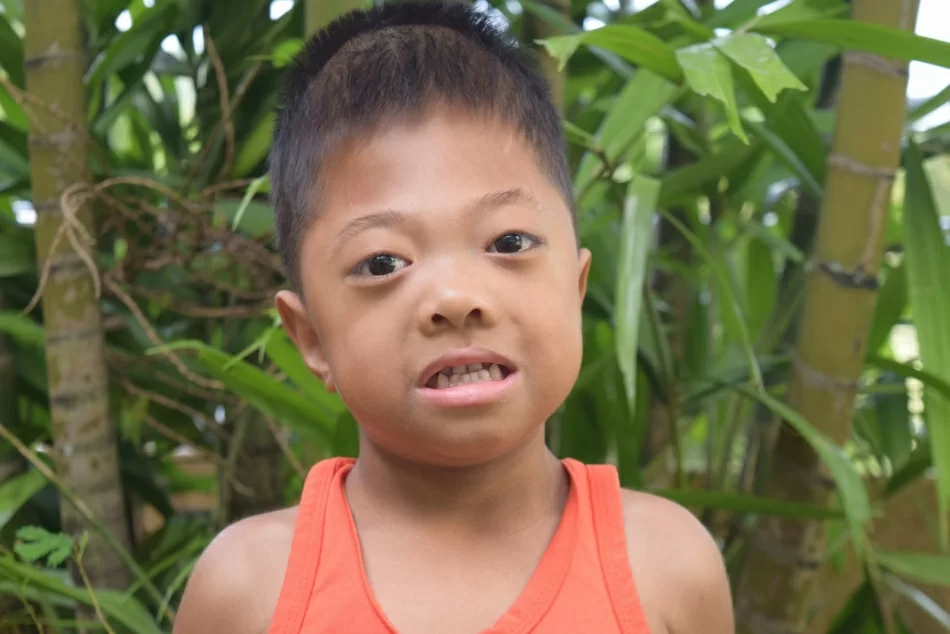
Rovelito Update
Rovelito is doing well following his surgery. He has some discomfort which is very understandable. The doctors feel that the surgery went well, The skin graft was taken from the right thigh, and his left arm will be immobilized for three weeks during the recovery. His attitude is great! Thanks to all who have prayed for him.





